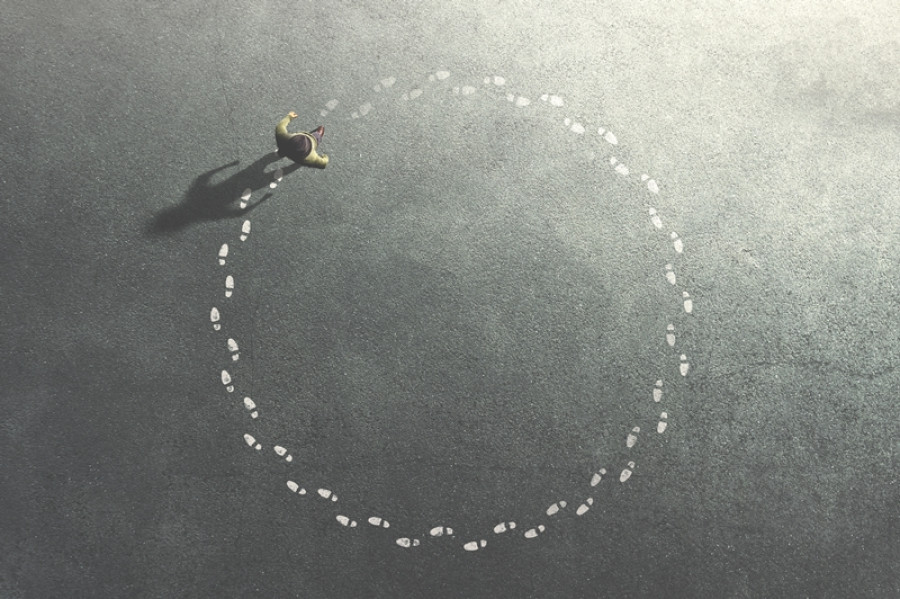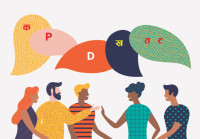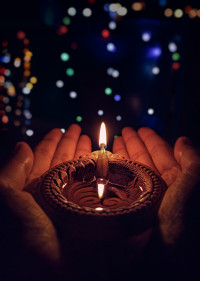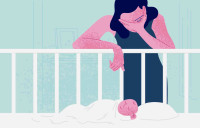As it is
The Tinkerbell problem
Three days into isolation, I had realised I wasn’t who I thought I was. This was a crisis.
Shefali Upreti
A day before the lockdown, I began to cough. A foreboding little tickle settled in my throat that evening and by morning the cough was dry and constant. It alarmed everyone. I was immediately sealed inside my bedroom, sitting alone on my bed and coughing to myself in my own quarantined air.
The cough didn’t alarm me: I hadn’t touched anyone or been near enough anyone; and for two weeks I had washed my hands with Dettol until they had become marbled with flaking red skin. The isolation didn’t alarm me either: I was thrilled about being by myself in the quiet. My mother slipped me meals and slipped away before she could no longer hold her breath; my father stepped in once he got home from work, wearing his white gloves and the scent of hospital rubbing alcohol, to listen to my lungs with his ice-circle stethoscope. As long as I coughed, I would be excluded from all family drama. When I heard shouting, I had permission to plug in my headphones and daydream. I had thought this would be, spoiled and obnoxious as it is, a recluse’s heaven: left alone, not having to perform orderliness or feign interest for anybody. It turns out I, spoiled and obnoxious as I am, was not a touch equipped for isolation.
Three days into isolation, I had realised I wasn’t who I thought I was. This was a crisis. I was no recluse: I hated being alone and dishevelled. I hated being unable to offer input, no matter how stupid or contrived, on the conversations I heard through the walls, no matter how stupid or hysterical. I especially hated that no one was looking at me. I took a disgraceful number of pictures of myself in various textures of light and was too ashamed to post them online, where everyone had become didactic and grim. There was no point in looking in the mirror at myself, either—I had read that young women never saw themselves accurately when they looked in the mirror, anyway. I required someone else to look at me and to react to me, no matter how unkempt I was, so that I would know what to feel about myself. My hair grew wilder, and I grew restless, and all online contact meant nothing. I felt as though I had begun to blur.
I realised in solitude that like Tinkerbell, from Peter Pan, I couldn’t exist without attention. It was vital for my well-being. Without validation, I was just a strange body housing a thousand scattered thoughts.
The realisation of this chimeric self rolled me down a slow, paranoid spiral. I would sit alone inside my body and wonder for hours who I really was and what I really wanted from myself and how I could ever truly know. I would distract myself by plodding along with work, with Jeanette Winterson—whom I’d started reading out of pure luck and who talks about so many separate selves with so much confidence—with staring out my window at the fixed, white and leafy façade of my neighbour’s house, with the abnormally loud birds, or with a grisly line-up of American cult horror. But the betrayal of myself would always return and I would have nowhere to go, feeling like an imposter in my own body and not knowing to whom I should apologise for it. Besides, my cough was worsening.
I had known that the isolation would be self-revelatory—solitude always is. It’s not just a matter of being left alone with our thoughts in the silence. We experience silence every day, hours of it—through the night, on the commute, in the hours of autopilot action that allows our brain to keep ticking along without having to focus or talk or listen. We consider ourselves constantly, our bodies and our ideas and how we appear to those we want to talk to or work with. We think we know ourselves, and we perform who we are, even in silence.
Solitude left me with no one to think about myself through, and I had forgotten any other way of thinking about myself. Without minute to minute impressions guiding me, I was lost. As my sense of self distorted until I had recreated a minor but eerie cult horror in my head, my energy levels plunged, lower than the drowsiness that the doses of prescribed codeine warranted for. Limbs ponderous, I lay in bed in a sweaty fugue with no memory of ever going to sleep or waking up. I dreamed that the neighbour’s dogs climbed the trees in the night and perched at my window, and when I awoke to their barking I wasn’t sure that it had been a dream. When I lay awake for too long, my arm moved by itself and frightened me awake. A slight fever came and left and came back. My dad pressed his stethoscope into my back and commanded me to inhale and told me I was fine.
I told him I needed something to make me alert and happy. He told me to take a shower.
It took eight days for my body to shake the cough off well enough for me to leave my bedroom. I emerged like a wild animal exiting a cave. The prospect of the great outdoor—the roof—caused me great anxiety, like a slimy cryptid recoiling from fresh air. Yet there was nothing I wanted more than to find a good patch of direct sunlight, somewhere people could look at me and I could look at them, and look at them looking at me. I needed to be able to perform in the eyes of others, just to feel like myself again.
The hours it took me to repair myself after eight days in isolation are unbelievable. It wasn’t just my knotted hair, which took four hours and a great deal of upper-arm strength to fix, or my splotchy face, my cracked lips or the blue rings stamped around my eyes that needed attention. During lows in real life, I have consciously sacrificed how I look to conserve energy for the tasks that are binding—like going to work and crossing things off my list of tasks and forcing down at least one of three meals. In a single week of isolation life, by not knowing how to ready myself for myself, it was as though I had tricked my body into a leaden slump I would have to work methodically to get out of.
Since I’ve been let out, I’ve relied on the routine of readying myself for the eyes of others to ground myself amidst the heart-pounding terror of being an unknowable stranger in a body whose inner workings are a mystery. Who is it and what ails it and what does it want? Perhaps future days of solitude will tell, but for now, I take refuge in what I know will work: allowing others to pay me attention and create for me my sense of self.



 9.89°C Kathmandu
9.89°C Kathmandu










